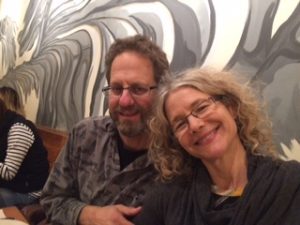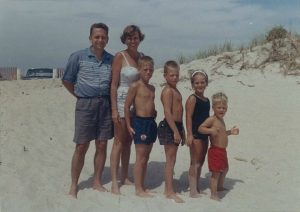
THE SHOUTING LUSKINS
My newest sister-in-law calls my family The Shouting Luskins. It’s true, we’re a noisy bunch, all wanting to be heard, in part because none of us listens very well.
I remember a day in June, 1977, when my father and I stood outside our rented car at a crossroads in Devonshire, England, shouting at each other.
“Can’t you read the goddamned map?” he yelled.
“I told you which way to turn a mile ago, but you didn’t listen!” I screamed back, stomping my foot.
I was reminded of this episode recently, when I found myself shouting at my dad, whose listening skills have never been very good, and whose hearing loss is nearly complete.
Hearing, A Casualty of War
Dad fought in the infantry in Europe during World War II, which I suspect was the beginning of his hearing loss. It was only exacerbated by his early professional life as an oceanographic researcher in the days before workplace hearing protection became commonplace. His hearing has deteriorated, and he’s never been particularly interested in adapting his behavior to communicate with others.
He’s tried any number of hearing aids. “All they do is amplify!” he says every time he puts them in a drawer instead of his ears.
He’s just done this again, leaving me shouting at an old man, and still not being heard.
So our shouted communication has a long history, and it’s gotten worse in the past few months. But I don’t want it to continue.
Frustration
It’s obviously not doing any good. When Dad doesn’t wear his hearing aids and when he doesn’t try to listen, lip-read or otherwise attend to what I have to say, I don’t just become hoarse; I become hypertensive. My blood boils.
One of my three brothers suggested, “Change the format. Take him out.”
He doesn’t want to go out.
He wants to stay in his room and fret over how he’s going to leave his worldly possessions when he dies. He has a will, which he no longer remembers, so he asks me questions to which he can’t hear or understand my answers.
Lowering the Volume

It’s a sore point with me that I feel as if my father has never listened to what I have to say; but when my brothers tell him the same information, he processes it. All my life I’ve tried to avoid the subversive methods that women have traditionally turned to in order to achieve what they want by manipulating men. I’ve had limited success. But I’m also a problem-solver with an imagination, so I’ve changed the format of our discourse.
I brought a small white board to my last visit. Instead of shouting, I printed what I had to say.
We both benefited.
Reading gave Dad more time to process my answers to his questions.
Writing the answers took enough time for me to edit them for simplicity – and to eliminate the snarky comments that slip in when I became exhausted from repetitive shouting. We’re now communicating without shouting.
Victory & Validation

But it’s also a personal victory and validation. The victory: my father has “heard” me via my voice on the page; a validation: I’m sure one of the reasons I’m a writer is to be heard in a way I never was at home. For years, I’ve had an audience moved by my essays, radio commentaries, editorials, short stories, novel and blog; now, I have a voice in my family of origin as well.
Victory for sure! Beautifully crafted words-just one of your many talents.
Thank you.
How sweet to finally be seen and heard by your Dad…and how amazing all this really led you to become the beautiful writer that you are….
We are often not seen or heard by our fathers..especially when they were in WW2..and came back to little girls. I became my Dad’s pretend son until I grew up…his little “Zippy”…..and the sad thing was he past away feeling never heard himself. But I feel he is seen and heard now and he knows I am his forever loving daughter….our ancestors are always with us in spirit…😍
Also your new sister-in-.law…maybe a distance ….relative of mine😄….
Signing out.
Zippy ( Aylanah, Laurie) Katz
i love this: changing modalities and finding peace and the revelation of a source of why you write. i often write as if my life depended on it. i have been starting to look at why that intensity.
Thanks, Christina. I also feel as if my life depends on writing – in so many ways. These interactions with my dad go to my very core.
Interesting essay. Now that my Mom is gone (March 30, 2017) I wish I could hear those same stories that I heard countless times. They were always prefaced by…”If I told you this, stop me”, but I never did. My “blood boiled” but I learned to control it. I began to think to myself… if I hear these stories often enough, I’ll never forget them when Mom is gone. And now I have only my memory. Seniors often teach us patience which is not always an easily acquired virtue. You didn’t mention this situation as one of your challenges. I was trained to “listen” in my career as a salesperson. It needs to be taught since it is not an innate attribute for most people. This “Training” to listen, has served me well during my lifetime. It helps you differentiate between “Perceived Objections” and “Real Objections”.
When you write, “I become, hoarse and hypertensive”, the challenge really becomes… how do I conquer my own inner workings to be at Peace when with Dad. Some family members regretted deep remorse at my Mom’s passing that they could have done far better for her while she was still with us. In his remaining days, pursue every avenue possible (like your written communication) so you too can say…”I did all I could and I have no regrets”
Many veterans suffered hearing loss from combat, especially artillery. Remember , if that is what the cause of his hearing loss may be, that he accomplished for all of us what is written on the back of the World War II Victory Medal. “Freedom from fear and want, Freedom of religion, Freedom of speech. I’m sure he has that Medal.
Anyways, we are all humans, who all struggle with these same issues. The solution and Peace come from within. The challenge is eternal. All one can do is try. What Infantry Division was he in ? You might want to consider a blog on his Division and what they did.
Thanks for sharing your story, Peter. We each write our own truth, from our own experiences – resulting in an astonishing variety of responses to similar events. I think we all do better by acknowledging one another’s unique response than conforming to someone else’s idea of what’s appropriate.
I am sorry your father’s world has started to shrink down to his room. I remember him as a strong, vibrant, intelligent funny guy. I am glad you found a way to “speak” to him again. Without communication of any sort we are terribly alone.
Thanks for your kind words, Wendy.
Deafness can be very frustrating all round and some people say that it is more isolating than being blind. My dad died in 2012 but became quite hard of hearing in his later years which meant it was very difficult for him to use the phone, but he was great with emails.
I know that you’re talking about your dad’s physical loss of hearing, but it’s made me think about times when I don’t really listen to someone or feel that someone isn’t really listening to me. Properly listening is a skill that sometimes get lost in the day to day noise of life.
On a slightly different note, I so wish I’d asked my mum and dad more questions about their lives before they died. No matter how elderly they get, you still think they’ll be around forever.
Yes, listening is both a matter of physical ability and behavior. As I find hearing ever more difficult in noisy surroundings, I’m practicing good listening habits more and more. These include listing face-to-face and making eye contact; affirming the words I hear; restating what I heard; and refraining from divided attention – as in electronic devices.
As for your other comment – yes, I’ve become aware of questions I can no longer ask my mother and to which her brother doesn’t know the answer. Fortunately, both she and my dad have written memoirs (simple typed documents in a binder) with family history going back to their grandparents. Some days, I can get my dad to tell stories of the past, but he tells even familiar ones differently now, so I’m not sure how reliable a narrator he is now. *Sigh*